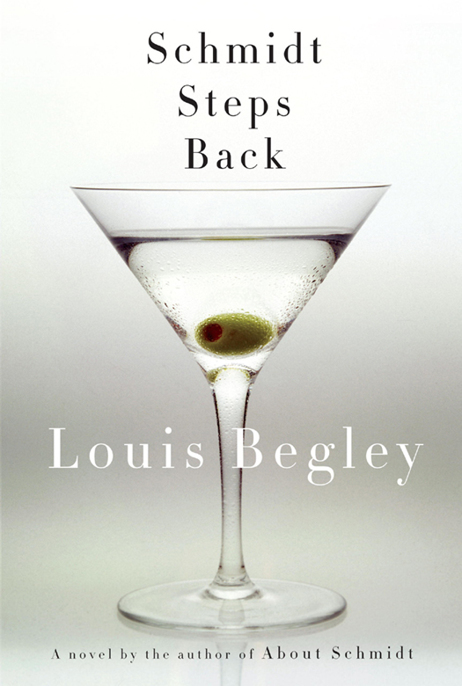
Schmidt Steps Back
A Novel
کتاب های مرتبط
- اطلاعات
- نقد و بررسی
- دیدگاه کاربران
نقد و بررسی

Starred review from March 1, 2012
In the third of the Schmidt novels, what had been described as a comedy of manners turns tragic and redemptive. Updike had Rabbit, Roth has Zuckerman, Richard Ford has Bascombe and Begley has Schmidt. While all serve a similar purpose, to illuminate American life and culture through the passages of one man's maturation, the return of "Schmidtie" represents a significant advance from preceding volumes (Schmidt Delivered, 2000, etc.). An even longer interval has passed in Schmidt's life than between books, since the protagonist readers knew in his early 60s is now 78 (it's hard to imagine Jack Nicholson continuing in this role). Now deep into his second career, as a retired lawyer turned foundation head, he is much more concerned with topical events--wars and terrorism and politics (he loves Obama). And he has found new love with a woman who is more age appropriate, merely 15 years his junior (in contrast with the promiscuous waitress, younger than his daughter, who continues to play a key role in his life). Artistically and thematically, this is the most ambitious novel in the Schmidt cycle, also the longest, and it requires familiarity with the earlier volumes to appreciate its richness. It ties the ends left loose at the conclusion of the last--his relationships with his daughter and his former lover, and the anticipation of the two babies that will make him a grandfather (and perhaps a father as well). Yet chronologically this isn't a mere continuation of the Schmidt narrative, but one that finds him reflecting ("stepping back"), coming to terms with some pivotal episodes that were either downplayed or omitted from the first two novels. He has arrived at a place where he feels he has "at last grown up," possibly capable of a "rebirth." Yet, given the course his life has taken and the stage at which he has arrived, he compares himself to Lear and Job, facing what is likely his "last chance." The good news is that Schmidt still feels he has 10 years to live, which likely means at least one more novel.
COPYRIGHT(2012) Kirkus Reviews, ALL RIGHTS RESERVED.

October 1, 2011
Hispanic waitress Carrie has spurned his marriage proposal, and daughter Charlotte remains chilly, but lawyer Albert ("Schmidtie") Schmidt is back for another round (after About Schmidt and Schmidt Delivered). Now that both women are otherwise engaged, Schmidt is wondering how good he'll be at persuading the French widow of a former partner to take an interest in him. Begley is always sparkly and acerbic; buy where he has a following.
Copyright 2011 Library Journal, LLC Used with permission.

Starred review from January 1, 2012
Begley continues the saga of Schmidt (About Schmidt, 1996; Schmidt Delivered, 2000), a self-described maverick WASP attorney who now heads a foundation established by his magnanimous billionaire Jewish Egyptian friend, Mike Mansour. At 78, Schmidt is widowed, vigorous, shrewd yet romantic, with a gargantuan capacity for alcohol, sex, and transatlantic flights. His one sorrow is his contentious relationship with his difficult daughter, Charlotte, whose horrid husband and in-laws are hell-bent on vacuuming up Schmidt's fortune. His ardor is Alice, the enigmatic French widow of a lawyer Schmidt affectionately mentored, who harbored his own explosive secrets. Begley's many-stranded, meticulously detailed, snake-charm-mesmerizing, emotionally tempestuous plot, which has volatile Schmidt schooling himself in a new practice of restraint and patience, depicts the enclave of privilege that is the seat of world power and is strategically pegged to the catastrophes of the last two decades, from the AIDS epidemic to the Oklahoma bombing, 9/11, and ever-worsening economic and political crises. Begley's seductive, subversive, and commanding novel of wealth, manners, desire, and retribution, with its many sly allusions and contrasting pragmatism (money for sex) and radiance (Schmidt's love and largesse for his former mistress and her new family), reminds us that the elite are not immune from pain and tragedy. They just suffer in fancier houses and drink better gin. HIGH-DEMAND BACKSTORY: Begley's dry-martini wit, peerless eye for social mores, and delectably complex hero Schmidt have a following, which will increase with this superb tragicomedy.(Reprinted with permission of Booklist, copyright 2012, American Library Association.)

























دیدگاه کاربران